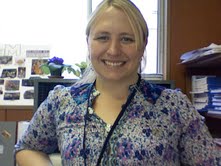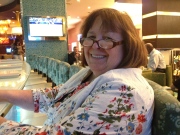 This Friday, March 7, 2014, the Women’s Caucus (WC) of the American Academy of Religion, Western Region will be hosting its annual “Professional Development Panel and Workshop” in Los Angeles, CA. During the workshop panelists and attendees will consider what ‘gardens’ we have grown in, who our ‘mothers’ are and how this impacts what we bring to the table or what ‘gifts’ we bring to the table when dialoging with and across differences. Our title and praxis at this event is also meant to honor our feminist mothers. Specifically I would like to recognize and honor Letty Russel, Katie Geneva Cannon, Kwok Pui Lan and Ada Maria Isasi-Diaz. Among many other accomplishments, these women edited the 1988 volume entitled: Inheriting Our Mothers’ Gardens: Feminist Theology in Third World Perspective. This book helps to give voice to women marginalized within feminist theological discourses and is the inspiration for our panel’s title this year.
This Friday, March 7, 2014, the Women’s Caucus (WC) of the American Academy of Religion, Western Region will be hosting its annual “Professional Development Panel and Workshop” in Los Angeles, CA. During the workshop panelists and attendees will consider what ‘gardens’ we have grown in, who our ‘mothers’ are and how this impacts what we bring to the table or what ‘gifts’ we bring to the table when dialoging with and across differences. Our title and praxis at this event is also meant to honor our feminist mothers. Specifically I would like to recognize and honor Letty Russel, Katie Geneva Cannon, Kwok Pui Lan and Ada Maria Isasi-Diaz. Among many other accomplishments, these women edited the 1988 volume entitled: Inheriting Our Mothers’ Gardens: Feminist Theology in Third World Perspective. This book helps to give voice to women marginalized within feminist theological discourses and is the inspiration for our panel’s title this year.
Preparing for this panel, I reflected that many of those who contribute to this blog have written about their mothers (biological or non-biological) and mothering. (Most recently I found myself inspired by Marie Cartier’s meditation on aging, health, her mother and religion.) I realized that I have said very little about my own mom; my mom, who I am so like, who I look like, and who is both my mother and my friend. I have definitely ‘inherited her garden,’ so to speak: flowers, herbs, weeds, rocks and all. So, momma, this blog is for you.

As a young child, I sat at a round, wooden table with my mother and siblings to eat my dinners and do my homework. My mother was a teacher for nearly 40 years and she would sit with us for what felt like hours at this little table to help us finish our work. I remember crying my eyes out many nights sitting there. I did not excel at school as a child. I found most of my homework very difficult, particularly math. Unlike all of the young girls in memoirs and books I have read since then who loved reading and found solace in stories, I hated reading as a child. It took too long, and was too hard. I had passionate feelings about what I could not do and could not understand. So I cried, hoping my momma would give me permission to stop doing my homework and give up. She never did.
At the time, I felt like this was cruel: my mother was cruel for making me finish my work, my teachers were cruel for assigning me so much to do, and the work itself was cruelly difficult, as were all things that ‘good’ children were good at and at which I perceived I was failing. But my mother never gave up on me. She sat with me, and encouraged me. She listened to me while I cried. My mother taught me how to transform my slow and struggle-filled learning style into power. What I have discovered is that while, yes, I sometimes ‘learn slowly,’ I know enough to change a system, to apply evidence, and to create relationships by the time I am ready to speak and act. I learn carefully, because I work hard to hold this fragile knowledge in my hands.

My mother told me many times, “I have always read slowly.” I heard: “you are like me.” And it’s true. I am like her, though sometimes this has scared me. Lying in her hospital bed, colostomy bag affixed after a bad colon perforation that almost took her life, my mother smiled as the nurse told us, “Your daughter looks just like you.” I reacted, silently, in fear and defensiveness. My mother was sick. She almost died; and I found myself staring into the face of my own mortality. A year and a half later, she fell off a five-foot wall, carrying my nephew. She saved him, landing on her face, crushing her sinuses, splitting the skin above her eyebrow and breaking her arm. When I went to see her in the hospital she was barely recognizable, the bruising was so bad. But she lived. At almost 70, she fell off a wall and she lived, saving my nephew as well. My mother is so strong.
My mother was an amazing force in her classroom. I remember watching her one day with her 8th grade class. She was wearing a button down skirt that, all of the sudden, unbuttoned up to her mid thigh, exposing her slip below. I would have been mortified! 8th Graders, I thought, notice everything awkward and will be sure to laugh. I rushed to tell her, to save her any embarrassment. She laughed, casually buttoning her skirt, continuing to talk to the students she had been helping who didn’t seem to notice at all. Her affection for them was so complete as a nurturer and a guide. Yet, she was also tough with them, pushing them and respecting them. She never made them feel small. I watched them look at her and wanted to say, “Hey, that’s my mom,” wondering if these students secretly thought, ‘you must not know her like I do,’ such was the specialness of my mother and how she can make you feel.

I can see a little of her freedom, excitement and power in my own teaching. For all of my awkwardness in social situations, my inability to fit in that reached far past my undergraduate years, I feel a special calm in the classroom. I feel like myself and can feel myself caring in a way I want to care. I love this part of teaching and I love it more for how it makes me more like my mother.
I want to live in my mother’s stories of bravado, though I did sometimes wonder as shy as I used to be, as reserved, if this woman who was/ is my mother would want to be my friend if I had met her then. Then I remember that in 6th grade I told her she was my best friend. I have looked back at that moment and judged myself, I must have sounded so, so young. But she did not make me feel small either. She has never made me feel small.

I have had a complex relationship with my mother over the years. I write about the tensions of my childhood a great deal on this blog. But in my mother’s arms, I always find love. Focusing on our different choices and perspectives, I spent many years trying to carve a space for how I could be different than my mother. But as I am getting older, I am finding joy and love in re-membering those gifts she gives to me: her spirit, her funky style, her willingness to stand out, her intentional morality, her compassion, her tenderness, her ‘righteous anger.’ I finally learned my mother’s love of reading after years and years of practice. I love the divine differently than my mother, and with different words, but I hope, with the same spirit. These are fruits from the garden she planted for me and I bring them with me to the table.
If you live near or will be traveling to the Los Angeles Area on Friday, please join the WC as we continue to explore inheritance, mothering and gifts.
Panelists will include:
Robin Owens of Mount Saint Mary’s College, Los Angles
Sakena Young-Scaggs of Arizona State University
April Frykenberg of Claremont Graduate University
Jung Ja (Joy) Yu of Claremont School of Theology, and,
Ann Hidalgo of Claremont School of Theology
Part of re-membering is looking back to fill the silences in our histories and naming the “mothers” who have helped to build feminisms and empower us. Honoring these histories, we decry the dehumanization of oppression and reclaim life-giving parts of our communities and ourselves.
Sara Frykenberg, Ph.D.: Graduate of the women studies in religion program at Claremont Graduate University, Sara’s research considers the way in which process feminist theo/alogies reveal a kind transitory violence present in the liminal space between abusive paradigms and new non-abusive creations: a counter-necessary violence. In addition to her feminist, theo/alogical and pedagogical pursuits, Sara is also an avid fan of science fiction and fantasy literature, and a level one Kundalini yoga teacher.


So beautiful. Tears. Thank you!
LikeLike
Really nice post. I hope you show it to your mom!
LikeLike
I love the image of “garden”. My mother had a hard life, and there were lots of “weeds” in our garden! As I mature I appreciate more the courage she had, and the strengths she passed on to me.
LikeLike
Good for your mother and good for you to be so strong and passionate and honest.
LikeLike
Reblogged this on Lead Me On and commented:
This is a wonderful essay about the power of mentoring and teaching and loving and family. I particularly loved the story about how her mother taught her it was OK to learn slowly by gently, steadily holding a compassionate space for her to work through her frustrations! How I wish most leaders and teachers could use this kind of grace-filled honoring of individual gifts and journeys. What a lesson to learn, to embrace her own genius instead of thinking of it as a deficit! “My mother taught me how to transform my slow and struggle-filled learning style into power. What I have discovered is that while, yes, I sometimes ‘learn slowly,’ I know enough to change a system, to apply evidence, and to create relationships by the time I am ready to speak and act. I learn carefully, because I work hard to hold this fragile knowledge in my hands.” Beautiful. Thank you.
LikeLike
Thank you so much Carol!
LikeLike
You’re welcome. I really enjoyed your writing and thinking here!
LikeLike
I loved this piece, Sara. Your relationship with your mom reminds me in some ways of my relationship with my daughter. I’m the extrovert. She was always shy. I wouldn’t have cared at all about my slip showing. But as an 8th grader she would have been mortified. She found my extroversion hard to take as a child. But we now have a wonderful relationship. She’s one of my best friends.
LikeLike
love this… So glad my work was helpful in your thought process!
LikeLike
Thank you to everyone who replied. Your support and encouragement mean a great deal to me; and I will indeed, share this with my mother. :)
LikeLike